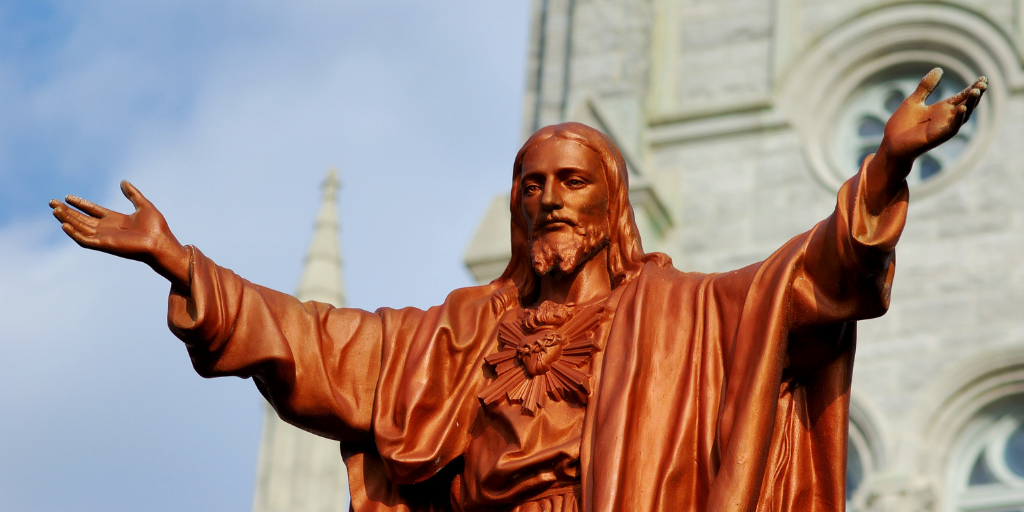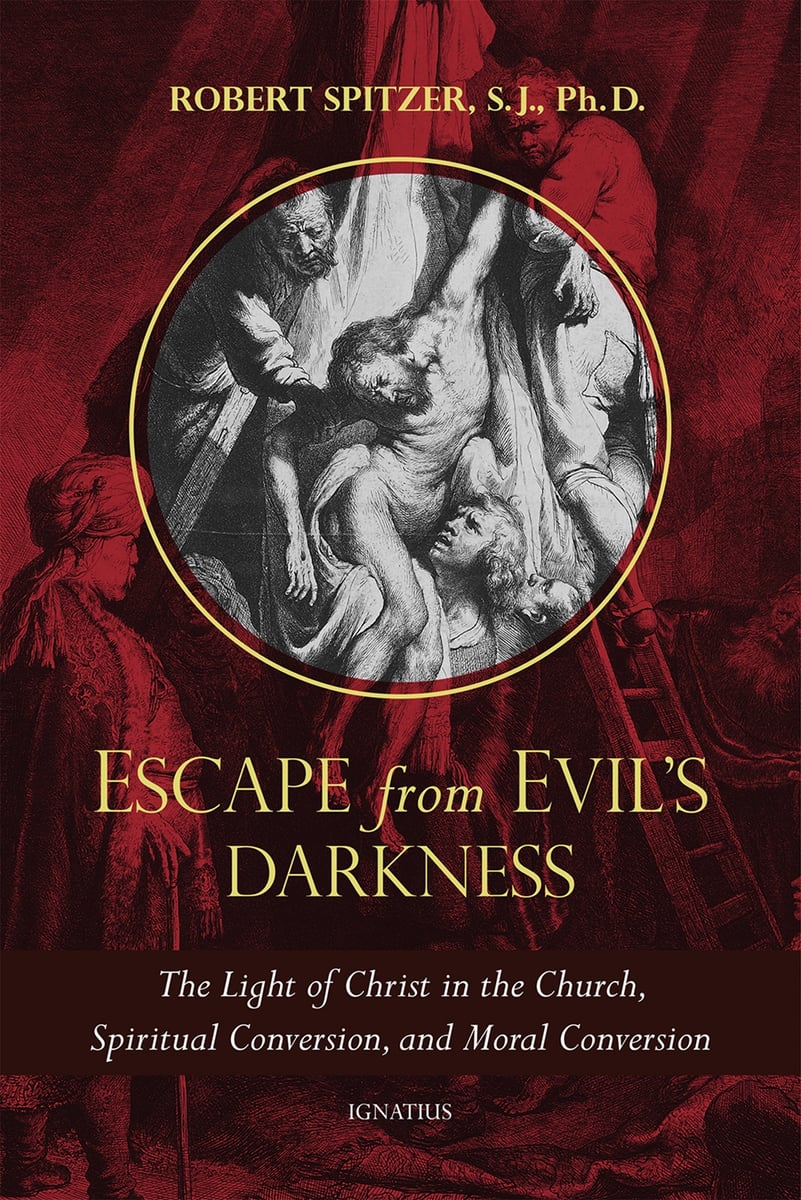
Jennifer Lindberg finds Fr. Robert Spitzer’s new book, Escape from Evil’s Darkness, a blueprint for keeping the light of Christ in our homes, world, and inner life.
I read Jesuit Father Robert Spitzer’s Escape from Evil’s Darkness, The Light of Christ in the Church, Spiritual Conversion, and Moral Conversion, on several levels:
- a friend of St. Ignatius and his Spiritual Exercises -- which I was gifted to learn on a 10-day silent retreat,
- a wife and mother,
- a lover and seeker of theology, and
- a devout Catholic seeking continual conversion.

It’s a dense book, packed full of so many treasures, that there is a gift for everyone here. Don’t let its size or intensity of subject matter bother you, because Father Spitzer breaks it all down nicely to help those who need more layman's terms, without sacrificing knowledge for those who want to go even deeper into theological thinking. Somehow, he manages to bring his words and teachings to all levels, which has to be a work of the Holy Spirit to speak to each person individually who picks up this book.
I like Escape from Evil's Darkness because while you can read it from the beginning, it was possible for me to pick it up at any chapter and gain some real wisdom and practical application to my life. I also didn’t feel like I’d lost anything not having read the first book of the trilogy, but I would like to read them all.
If there is one tagline for this book it is: finding lasting connection in a world seeking to disconnect us from God’s love and light.
Father Spitzer speaks of:
- Community – an ache we all seem to crave especially in a world that seems more isolating than ever at times.
- The power of the Eucharist – the force that drives every Catholic, sustained every saint, and welcomes us everyday if we want into a heavenly liturgy so powerful, we only need to learn how to grasp it.
- Fear – how it exhausts and depletes us and how we can harness it for the correct motivator while seeking truth and love.
- Practical prayers and exercises for growing in virtue and not giving the devil any foothold in our life -- because all things are possible with Christ who is pure light to drive away all our shadows of sin, despair, and hurts.
Community
If there is one word so misunderstood it is this one. We either focus too much on it or not enough. We hear how Protestants have better community, but we fail to explain that community isn’t just about having coffee and donuts after Mass and speaking to our neighbor. It’s about spiritual and moral conversion.
Father Spitzer says community is all about how “God is present to every human being through the numinous experience and the intuition of the sacred.”
Human beings are interpersonal and we have a one-on-one relationship with God through our relationships with others that brings us deeper into our interior life. That means the more we grow in virtue the better we serve the humanity that God made “because our lives are tied with one another, such that we can contribute to or diminish happiness, love, and goodness through our words and actions,” (32)
These words and actions are taught to us by Scripture and the teaching authority of the Catholic Church to guide us in ritual, worship, symbol, revelation, and our relationship with God and others.
Which leads to Eucharist:
Father Spitzer calls the Eucharist the highest form of intimacy, because Christ lives in us as a dwelling. Christ used this word of living in us to signify the transformative effects that comes with this union. We may live with others and be transformed by their love and having some of their traits rub off on us. How much more than with receiving the Eucharist with “heart to speaking to heart,” as St. Francis de Sales and St. John Henry Newman penned.
Father Spitzer says the Eucharist is “beautiful and efficacious gift of personal transformation and life” (page 114).
As Catholics, the Eucharist is what sets us apart. It is our source and summit of the faith that Christ gave us to literally receive Him, body, blood, soul, and divinity. Father Spitzer asks an interesting question that all Catholics should ask for themselves. He wants to know why anyone would turn away from the precious gift of the Eucharist and the Sacrament of Reconciliation. Why wouldn’t everyone want to be Catholic? If this is true, why wouldn’t every Catholic do everything they could to promote the teachings of the Church about the Eucharist and take better care of how we receive Our Lord in the Eucharist?
A good starting point is the five Eucharistic graces listed on page 105 that outlines how Christ works in us when we are in a state of grace to receive Him in the Eucharist; spiritual peace, forgiveness and healing; transformation in His image, unity with the Mystical Body and everlasting life.
Fear
Father Spitzer makes a bold claim on pages 386 to 391 that fear while seen as a powerful motivator produces only a “short term jolt into action, but the negative state of mind,” will not bring us to the objective of spiritual and moral conversion that is love.”
It reminded me of a priest’s advice from long ago to me, that “fear is the chief motivator of all our faults,” inducing us to temptation and wrong decisions. In fear we forget to not only love, but to think. It is natural to have fear, but it is how we take it to the Lord asking Him to show us the truth versus the lies in a situation that brings us courage and relief.
There is a lot to fear in life at times, but I am reminded by the victory of the cross as I read through how to escape from evil’s darkness by always seeking the spiritual and moral teachings I need to deal with any situation.
Virtue
Perhaps, my favorite part of the book thought is how to concretely grow in virtue and fight the vices that seem to reoccur. We all know the drill; we usually confess the same sins over and over. While we don’t want new ones, we sometimes feel we are making no progress. Enter the handy charts on page 319 and 420. Father Spitzer takes us through the means to conquer our vices with short meditations, practical advice, and prayers with the opposite virtue.
He uses the example of conquering greed with gratitude. We must first ask the Lord for the grace to recoil at what greed does to other and our relationship with others and how this opens the way for the evil one to bring us into darkness. By selecting the virtue to combat it, visualizing ourselves with God, using the St. Ignatius Examen of Conscience to overcome our fault, and other prayers listed in the appendix outlines a very workable plan for any state of life.
I think of Father Spitzer as using Escape from Evil's Darkness to be a wise scribe the Bible speaks about.
Every scribe instructed in the kingdom of heaven … brings forth out of his treasure new things and old. (Matthew 13:52)
Copyright 2021 Jennifer Lindberg
Image: Canva Pro
About the Author

Jennifer Lindberg
Author of "It's Three O'clock Somewhere," and award-winning journalist Jennifer Lindberg went from photographing Cindy Crawford on the red carpet to picking up toys and crumbs off her carpets at home. Six kids later, homeschooling eclectic, and divine mercy devotee, her carpet duties have lessened allowing her to write about hope, mercy, pilgrimage travel, and true self-care at Thinking From Hope or Instagram at @ThinkingFromHope.


.png?width=1806&height=731&name=CatholicMom_hcfm_logo1_pos_871c_2728c%20(002).png)
Comments